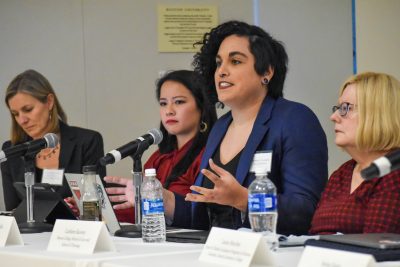Boston University School of Law held a Jan. 26 symposium to mark the 50th anniversary of Roe V. Wade and to unveil the brand-new reproductive justice program that BU will offer starting in fall of 2023.

Linda McClain, a professor of law at BU and one of the organizers of the symposium, said that the University organized the symposium to create a “multidisciplinary event” that brought together scholars and people active in reproductive justice organizations.
“We were trying to put together an event that would bring in many dimensions of what reproductive justice means and what it would look like to try to secure reproductive justice or seek it in a landscape without Roe v. Wade and possibly other constitutional protections,” McClain said.
The event invited 32 panelists split up into five different panels. Topics included the history of Roe v. Wade, the impact of the Dobbs case on medical practice, challenges of healthcare justice after Dobbs, the regulation of pregnancy and parenthood after the Dobbs case and the future of reproductive justice.
To commence the symposium, Angela Onwuachi-Willig, Dean of BU Law School and professor of law, spoke about the history of reproductive justice at Boston University and its role in the Eisenstadt v. Baird case.
“Boston University was a site of a watershed event in the struggle for reproductive rights… pro-choice activist Bill Baird gave an unwed student a contraceptive and was immediately arrested,” Onwuachi-Willig said before the first panel. “Baird took his case to the Supreme court in 1972, Eisenstadt v. Baird, and won the right for unmarried couples to use birth control.”
George Annas, the director of the Center for Health and Human Rights, talked about what he hoped people took away from the first panel.
“The whole area is a lot more complicated than just pro-choice and pro-life and political slogans,” Annas said. “There were some terrific presentations about medication abortion and the efforts in various states to outlaw medication abortion… and those are really really important issues with practical issues.”
Renée Landers, professor of law and faculty director of the Health and Biomedical concentration at Suffolk University said that the panel was important because it showed people the “practical impact” that Supreme Court decisions have on everyone’s lives.
“Another impact of the panel was to demonstrate that even in states like Massachusetts… we have to keep working to make sure that access is truly available and not just hypothetically available because the law is protective,” Landers said in an interview.
Shannon Gonick, a third year law student and co-president of If/When/How, moderated the fourth panel.
“The symposium was undoubtedly my favorite event at the law school to date,” Gonick wrote in an email. “All of the panelists spoke frankly about the largely dire state of (reproduction) law and policy, but they inspired me with their dedication and cautious optimism.”
Annas said he believes that the majority of people who attended the symposium agreed the overturning of Roe v. Wade was a “political opinion, not a legal opinion.”
“The organizers of the event made it clear that they’re starting a new organization on reproductive justice, and that will be the legacy of this meeting,” Annas said. “The big significance (of the event) will be what that organization does, and I do look forward to that.”























































































































